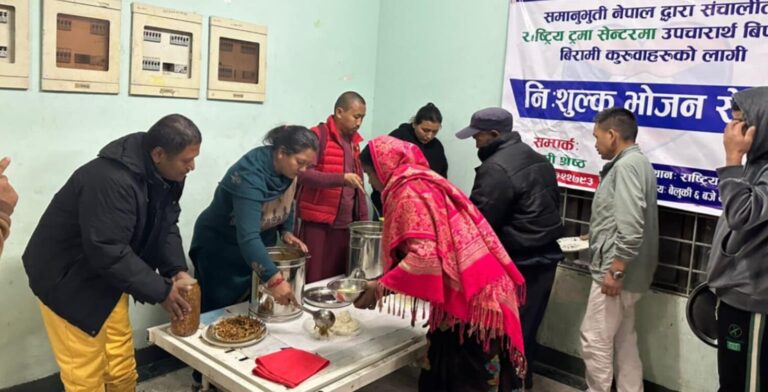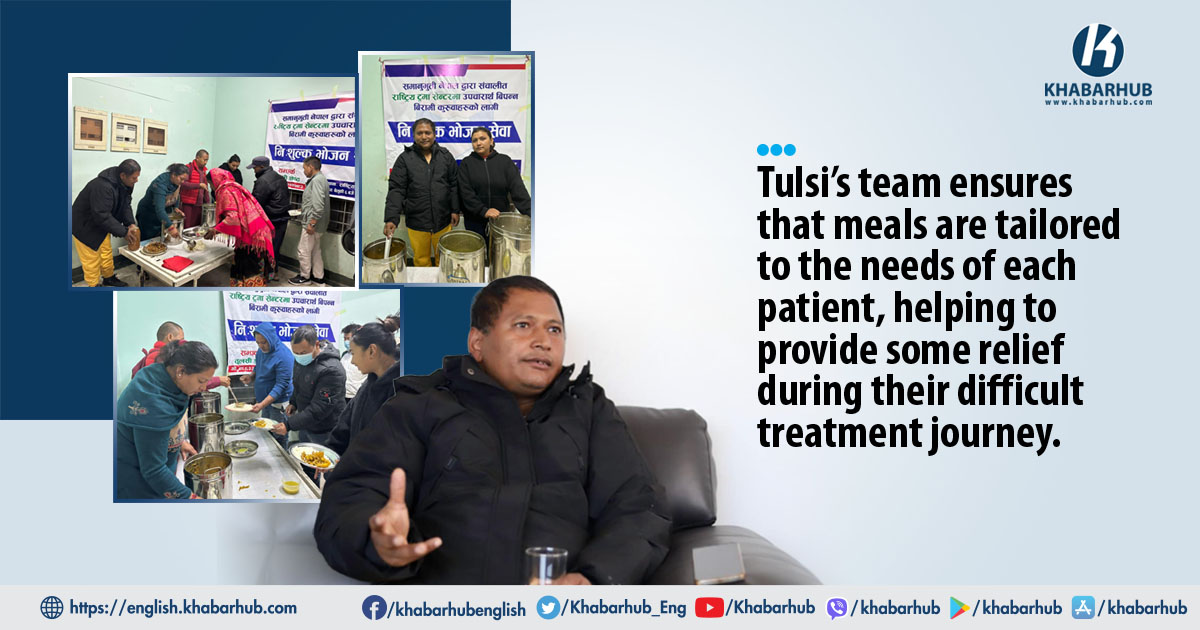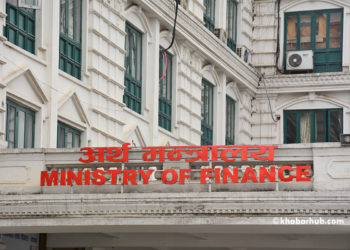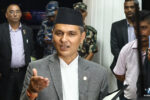KATHMANDU: Tulsi Shrestha (45), from Gokarneshwor Municipality-6, Jorpati, has been feeding patients and the needy in hospitals for the past five years.
His journey began during the Covid crisis, when he never imagined that this work would continue for years.
Amid the lockdown, Shrestha witnessed the hardships of his neighbors and the community.
Driven by a desire to help, Shrestha’s family began distributing free food to offer some relief.
Initially, they fed 150 to 200 people daily, all at their own expense. During the lockdown, food was distributed exclusively in Ratna Park, Kathmandu.
However, Tulsi soon realized that the need for food went beyond this area.
“I started noticing that the biggest problem was in government hospitals,” Tulsi shared.
“I saw patients who were starving, some couldn’t even afford basic medicine for their treatment. This inspired me to focus my efforts on hospitals and start a campaign to distribute free food.”
Personal story of service
Tulsi’s involvement in social work began when his family moved from Dhankuta to Kathmandu in 2050 BS.
His father was employed by the Agricultural Development Bank, and Tulsi studied up to a certain point before joining the workforce.
He later worked as a master chef in Saudi Arabia and Qatar for eight years.
When the Covid pandemic hit, and the lockdown was imposed, Tulsi witnessed the dire conditions of people in his neighborhood.
At first, news reports highlighted the struggles of many, but as time passed, Tulsi saw firsthand the suffering of those in the Bouddha and Jorpati areas. People were struggling to feed themselves.
Even vegetable sellers, those who work on carts, come to us and offer fresh vegetables for the cause. These are the people who truly understand suffering and have a genuine sense of empathy. It is their support that makes this work possible.
“I couldn’t bear to see this,” he recalled. “On the first day, we prepared and distributed food to around 150 people near our home. As we continued, the number of people needing help grew. My family came together to continue this work, all at our own expense. We initially thought we’d help for about a week.”
Expecting the lockdown to end soon and life to return to normal, Tulsi and his family planned to stop their food distribution.
However, the response they received through social media was overwhelming.
Photos and videos of their efforts began circulating online, attracting donors from all over. Many people, even those with modest incomes, began contributing to the cause.
“We are a joint family, so it was easy to work together,” Tulsi said. “No one in the family objected. Everyone helped with collecting goods, cooking, and distributing food. But as resources continued to come in, I didn’t expect the work to keep growing.”
Expanding the efforts
As the demand for food grew, Tulsi started feeding the homeless on the streets, especially at Ratna Park.
They began distributing food to hospitals, including Bir Hospital, Trauma Hospital, Tilganga, and others, providing up to 800 food packets daily.
Over time, he realized that the greatest need was in hospitals, particularly among homeless patients and their families.
“There were homeless people who had no one to care for them,” Tulsi explained.
“They were sick in the hospital, but their relatives often abandoned them. This situation was heartbreaking.”
In response, Tulsi and his team registered an organization called “Samanubhuti Nepal” and established a shelter to provide a safe place for these homeless patients.
Currently, the center, located in Kapan, houses about 40 people, including cancer patients who require long-term treatment.
The struggles of cancer patients
The cancer patients Tulsi helps are often from very poor backgrounds. Many come from families who have nothing left after paying for expensive treatments.
Even with the financial support from the government—one lakh rupees from the central government and 50 thousand from the local government—these amounts are insufficient to cover all their needs.
“The government’s support is a relief, but it’s not enough,” Tulsi said.
“Many patients have to stay in the hospital for months, sometimes years, and they are often left without enough food. Some have no money to buy food, so they rely on what the hospital provides, which is often insufficient.”
To address this, Tulsi and his organization now provide food to several hospitals, including Teaching Hospital, Kanti Hospital, Bir Hospital, Trauma Center, Patan Hospital, and Bhaktapur Cancer Hospital.
They ensure that the food provided meets the specific needs of each patient, especially cancer patients who require special care.
Special care for cancer patients
“Providing food to cancer patients is not easy,” Tulsi emphasized.
“Their nutritional needs are very specific. For example, they need high-protein foods like eggs, meat, and fruits—things that the hospital cannot provide. We prepare food based on their condition and in consultation with doctors. For cancer patients, food must be cooked carefully over a long period on low heat. Even a small mistake in their diet can have serious consequences.”

Tulsi’s team ensures that meals are tailored to the needs of each patient, helping to provide some relief during their difficult treatment journey.
A continued commitment
What began as a small effort to help those in need during the Covid lockdown has now blossomed into a full-fledged social service initiative.
Tulsi’s commitment to feeding the sick, homeless, and vulnerable continues to grow, supported by a network of donors and volunteers.
“My family and I never imagined this work would continue for so long,” he said.
“But we’re grateful for the opportunity to help. Every person we feed is a step toward making a difference.”
Joy and challenges of distributing free food
The people staying at his shelter are involved in cooking the food, and they’re happy to contribute to this meaningful work.
“My wife, for example, is busy cooking from morning to evening. We serve food at set times in the hospital, and now we transport it on scooters and tempos. We make sure to include dal, rice, vegetables, and pickles—nothing is left out. When donors ask us to include meat, we do so with pleasure.”
Responses from people
The blessings they receive from the patients are beyond measure. “When we serve food, the patients or their caretakers often say, “We’ve donated lakhs.”
“Their gratitude keeps us going. When we’re unable to bring food, we hear their voices of hunger, and it motivates us to continue,” he says adding, “One meal may be all they have, and for many, that one meal is enough to survive the day. That’s why we also provide dal and chiura (flattened rice) to make sure they don’t go hungry.”
According to him, even those who have money come to eat. Just because it’s free doesn’t mean that some Nepalis will refrain from taking more than their fair share.
“Interestingly, they often contribute more when the meal includes non-vegetarian items rather than vegetarian. As a result, we’ve had to tighten the distribution a bit,” he says.
After feeding patients in the hospital for years, they have learned to identify the real victims.
“As soon as we arrive, the genuine patients are the first to line up. Others who are not in need sometimes sit in line just to see what’s being served. While we can’t say no, we hope they understand that their actions may prevent those in real need from receiving food,” according to him.
The patients often share their personal stories—about their homes, families, and illnessesm he stated adding, “We even help them with their travel expenses when they leave the hospital after treatment. We’ve always managed these efforts based on their individual situations.”
Lack of trust in the government
Real tears can be seen in the hospital. Some people are forced to die without receiving proper treatment.
There are cases where relatives have abandoned patients in the hospital, and it’s also been reported that some patients have even committed suicide due to neglect. The root cause of these problems is a lack of proper treatment.
He stated that the government needs to make healthcare accessible to all citizens. Health insurance should be a priority, and healthcare should be as affordable or free as possible.
The current subsidies are just a drop in the ocean. There is a desperate need for more focused initiatives in healthcare.
Even vegetable sellers, those who work on carts, come to us and offer fresh vegetables for the cause. These are the people who truly understand suffering and have a genuine sense of empathy. It is their support that makes this work possible.
“Patients from remote areas, especially from Bhaktapur and Kathmandu, face immense challenges. I once saw a patient starving simply because he could only afford the medicine he needed, without the means to buy even a single meal or a cup of tea.”
Attempt to discredit the efforts
According to him, serving others is not the same as taking up a job or running a business. True service requires a heart as vast as the sky.
One must feel the pain of the suffering, the helpless, and the victimized. Service cannot be sustained by desire alone—it demands deep commitment.
“Unfortunately, some people have tried to undermine our efforts, which we carry out with sincerity and dedication. The District Administration Office even warned me at one point,” he laments.
“Without this intervention, I wouldn’t have understood the mischief of such individuals. The administration told me not to allow anyone with banners to enter our space.”
According to him, some individuals came to their site, took photos and videos, and misused them for their own benefit.
“I later found out that they had raised money by promoting our work as their own. They claimed they were helping us by raising 1.5 million rupees, while only giving us 100,000 rupees. We said, “Oh, you’re so kind,” but in reality, they were using our efforts to raise money for themselves.”
Will serve for life
“I will continue this work for as long as I live. My bond with the sick and the suffering has deepened, and I find fulfillment in this service. My relatives suggest I focus on business or other work, but I am happy with this path,” he states adding, “With my wife’s unwavering support, I am determined to continue, regardless of what others may say.”
If my wife had believed that this social service would not last, it would not have continued. But she has been supportive from the start. She never told me to go and earn money elsewhere. She, too, finds joy in this work.
From my experience, I’ve found that people with modest incomes are often the most supportive. Those who have suffered in hospitals understand the pain of others and are more likely to help.
Even vegetable sellers, those who work on carts, come to us and offer fresh vegetables for the cause. These are the people who truly understand suffering and have a genuine sense of empathy. It is their support that makes this work possible.









Comment